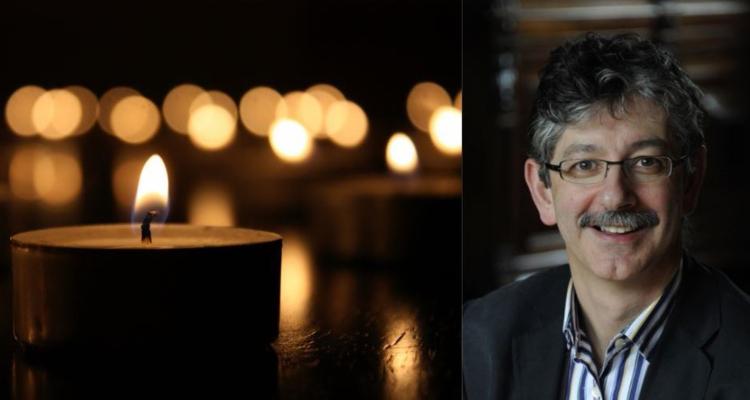The Mistress, Fellows, students and staff of Girton College mourn the loss of their colleague, friend, mentor and teacher, Dr Carlo Acerini (Official Fellow). Carlo made an immense contribution to medicine at Girton, and played an important role in the life and governance of the College. Our thoughts are with his family and friends, his patients and close colleagues at this very sad time; he will be greatly missed by us all.
Carlo Acerini (1962–2019)
Carlo Lorenzo Acerini was born in Greenock in Scotland in 1962. His parents had a confectionery business, and he was educated at Holt School, Haddington, and at Glasgow Academy. On leaving school, Carlo went on to the University of Dundee in 1980 and completed a degree in Pharmacology before deciding to train as a doctor (he squeezed two years of pre-clinical science into one very packed year in which he also met his wife, Pauline, who was doing a PhD in Pharmacology). His clinical medical student training was based in Ninewells Hospital, Dundee, and he qualified in 1988. In the spring of 1988 Carlo completed an elective at the Hospital for Sick Children in Toronto, which helped cement his choice of career pathway in paediatrics.
After house jobs in general adult medicine and surgery, Carlo started his paediatric training, later choosing to specialise in diabetes and endocrinology. His first academic post was at the University of Oxford, where he was appointed Clinical Research Fellow with Professor David Dunger in 1994. He came to Cambridge in 1997 as University Senior Lecturer and Consultant Paediatrician (Endocrinology and Diabetes) at Addenbrooke’s Hospital. His diabetes research centred on the development of new therapeutic approaches to the management of Type 1 diabetes in childhood and adolescence. This included work on the development of open and affordable closed-loop insulin delivery (artificial pancreas) systems and exploration of the use of adjunctive therapies for the improvement of insulin sensitivity and the avoidance of complications in Type 1 diabetes. He also set up the Cambridge Baby Growth Study in 2001, a prospective, longitudinal study designed to assess the impact of genetic factors and the role of the maternal in-utero environment in pre- and post-natal growth and reproductive health. Carlo published over 150 papers, and was a popular and well-respected speaker at national and international conferences.
Carlo led the development of the paediatric teaching programme at Addenbrooke’s, with a strong emphasis on clinical learning and evidence-based medicine. Recently, he worked closely with colleagues from obstetrics, general practice and emergency medicine to ensure that students can address clinical problems in children of all ages wherever they present. Carlo strongly defended the stand-alone Clinical Paediatrics clinical examination, meaning that Cambridge is one of only a few medical schools that still have ’real patients‘ (i.e. children) in Paediatric finals. In addition to his local and regional teaching role, Carlo influenced medical students globally through his editorship of the Oxford Handbook of Paediatrics which has sold over 80,000 copies and has been translated into other languages, including Mongolian.
Carlo first came to Girton in 2010, initially as a supervisor for the second-year undergraduate course in Human Reproduction and Endocrinology. He was soon appointed Bye-Fellow, and made such a significant contribution to Medicine that he became an Official Fellow within a year. For the last eight years he was the Director of Studies for first- and second-year undergraduates. Carlo served on the College Council for three years and helped with development activities overseas. He fully supported the wider activities of Medicine and the College community, delivering the concluding remarks at the Girton150 Medical Symposium less than a month before he died. Medical Fellows at Girton greatly valued his clear vision and discerning assessment of situations. In a gentle and calm manner, Carlo pursued any issue that really mattered to him, always embodying Girton’s ethos of excellence and inclusiveness.
Carlo had a great influence on students during their formative years; he was both supportive and encouraging and, as a result, was very well respected by the student body. Girton Medical students not only appreciated his teaching; they also confided personal concerns to him. On hearing of his death, many of Carlo’s students wrote tributes, all sharing the sentiments of the following selection:
- Thank you for devoting so much time, energy and effort on teaching us and checking up on us.
- You were my DoS and my interviewer – even before I started at Cambridge you made me feel comfortable here.
- You brought me out of my shell in supervisions. You were a mentor, a guide to life as well as a teacher.
- He managed to make every situation interesting and engaging.
- You were an inspiration and you’ve shaped the kind of doctor I want to be more than you could ever know.
- He was fundamental in our memories of Girton.
Carlo’s interests outside medicine were varied. He was a loving husband and father to his three children. He enjoyed cycling and keeping fit, and after the closure of Wolfson Court he parked in College before cycling to Addenbrooke’s every day. He was a keen beekeeper and planted vines in his garden in Little Gransden. His Italian heritage instilled in him a passion for food and wine.
Carlo was a dedicated medical educator, astute researcher and excellent clinician. He has inspired many Girton Medical students, and will be greatly missed by his patients, colleagues, family and friends.
Fiona Cooke, Official Fellow in Medicine

